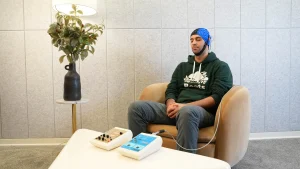In the tapestry of human experiences, music stands out as a powerful and universal thread that weaves its way through our emotions and thoughts. Beyond its melodic allure, music has been found to have profound effects on mental health. In this blog, we’ll embark on a journey to unravel the intricate relationship between music and mental well-being, exploring the therapeutic potential of melodies, rhythms, and harmonies.
The Emotional Resonance of Music – The emotional resonance of music is a profound and universal experience that transcends cultural boundaries. Melodies, rhythms, and harmonies have the power to evoke a wide spectrum of emotions, offering a therapeutic journey that resonates deep within the human soul.
- Elevation of Mood – Music has the remarkable ability to evoke emotions and uplift the spirit. Upbeat tunes, harmonious melodies, and rhythmic patterns can trigger the release of neurotransmitters like dopamine, often referred to as the “feel-good” chemical. Listening to music that resonates with positive experiences can elevate mood and create a sense of joy and happiness.
- Stress Reduction and Relaxation – In the fast-paced rhythm of modern life, stress has become a constant companion for many. Music serves as a potent antidote to stress, with soothing compositions and calming rhythms triggering the relaxation response. Listening to music can lower cortisol levels, reduce muscle tension, and promote a state of tranquility.
- Expression of Emotions – For many, music becomes a channel for the expression of emotions that may be difficult to articulate. Whether through poignant lyrics, instrumental compositions, or dynamic rhythms, music provides a safe and creative outlet for individuals to process and convey their feelings.

The Therapeutic Power of Music
The therapeutic power of music extends beyond its auditory appeal, serving as a healing force for mental and emotional well-being. Music therapy harnesses the profound impact of melodies, rhythms, and lyrics, offering structured interventions that promote cognitive, emotional, and social healing.
- Music Therapy – Recognizing the therapeutic potential of music, professionals in the field of mental health employ music therapy as a structured intervention. Music therapists use various musical elements to address emotional, cognitive, and social needs. This approach has been shown to be effective in treating conditions such as depression, anxiety, and trauma.
- Cognitive Benefits – Engaging with music stimulates cognitive functions, including memory and attention. Music can be a powerful tool for individuals with cognitive disorders, such as Alzheimer’s disease, providing a means to connect with memories and enhance cognitive abilities.
- Social Connection – Music has the unique ability to foster social connections. Group musical activities, whether playing instruments together or singing in a choir, promote a sense of community and belonging. This social aspect of music contributes to positive mental health outcomes.
- Empowerment and Inspiration – Inspirational lyrics and motivational tunes have the power to instill a sense of empowerment and resilience. Many individuals find solace and strength in music during challenging times, using it as a source of motivation and inspiration.

Music is a highly personal experience, and what resonates with one person may differ for another. However, certain genres and specific tracks are often recommended for their calming, uplifting, or soothing qualities. Here’s a diverse selection of music that may contribute to better mental health:
Classical Music
Ludwig van Beethoven – “Moonlight Sonata”
Johann Sebastian Bach – “Air on the G String”
Wolfgang Amadeus Mozart – “Eine kleine Nachtmusik”
Ambient and Instrumental
Ludovico Einaudi – “Divenire”
Brian Eno – “Music for Airports”
Hammock – “Turn Away and Return”
Nature Sounds and Relaxation
Sounds of nature: Rainfall, ocean waves, bird songs
Meditation music with Tibetan singing bowls or crystal bowls
Folk and Acoustic
Fleet Foxes – “Helplessness Blues”
Jose Gonzalez – “Heartbeats”
Iron & Wine – “Naked as We Came”
Upbeat and Uplifting
Pharrell Williams – “Happy”
Bob Marley & The Wailers – “Three Little Birds”
Imagine Dragons – “On Top of the World”

Jazz and Blues
Miles Davis – “So What”
Norah Jones – “Don’t Know Why”
B.B. King – “The Thrill Is Gone”
World Music
Ravi Shankar – “Raga Jog”
Ali Farka Touré with Ry Cooder – “Diaraby”
Buena Vista Social Club – “Chan Chan”
Pop and Indie
Ben Howard – “Keep Your Head Up”
Alessia Cara – “Scars To Your Beautiful”
Florence + The Machine – “Shake It Out”
Electronic and Chillout
Tycho – “A Walk”
Bonobo – “Black Sands”
Odesza – “A Moment Apart”
Meditative and Mindfulness Music
Deva Premal – “Gayatri Mantra”
Tibetan Meditation Music – “Om Mani Padme Hum”
Jon Hopkins – “Breathe This Air”
Remember, the key is to explore and find what resonates with you personally. Creating playlists with a mix of these genres can offer a diverse range of musical experiences for various moods and moments, contributing to an overall positive impact on mental health.

Music Therapy
Music therapy is a structured and evidence-based form of therapy that utilizes the power of music to address physical, emotional, cognitive, and social needs. Trained music therapists employ a variety of musical elements, including rhythm, melody, harmony, and lyrics, to facilitate therapeutic experiences. Here are some key aspects of music therapy:
Individualized Approach – Music therapists tailor interventions to meet the specific needs and goals of each individual. This personalized approach allows for flexibility in addressing a wide range of conditions, including mental health issues, developmental disabilities, and physical impairments.
Emotional Expression and Communication – Music provides a non-verbal means of expression, making it particularly effective for individuals who may find it challenging to articulate their emotions verbally. Through music, clients can express feelings, memories, and experiences, fostering emotional communication and connection.
Cognitive Stimulation – Engaging with music stimulates various cognitive functions, including memory, attention, and problem-solving skills. For individuals with cognitive disorders such as dementia, music therapy can evoke memories and improve cognitive abilities.
Physical Rehabilitation – Music therapy is often integrated into physical rehabilitation programs. Rhythmic elements of music can be used to improve coordination, motor skills, and overall physical functioning. It is particularly beneficial for individuals recovering from strokes or traumatic injuries.

Promotion of Relaxation and Stress Reduction – The soothing qualities of music make it an effective tool for promoting relaxation and reducing stress. Listening to calming music or participating in guided music relaxation exercises can help individuals manage anxiety and improve overall well-being.
Social Connection – Group music therapy sessions provide a platform for social interaction and connection. Collaborative musical activities, such as playing instruments together or singing in a group, enhance social skills and foster a sense of community.
Therapeutic Techniques – Music therapists employ a range of techniques, including improvisation, songwriting, lyric analysis, and guided listening, depending on the therapeutic goals. These techniques are adapted to the unique needs and preferences of each client.
Conclusion
As we navigate the complexities of our mental well-being, the influence of music emerges as a harmonious force that transcends cultural boundaries and resonates with the human soul. From the joyous melodies that lift our spirits to the therapeutic applications of structured music therapy, the effects of music on mental health are vast and profound. So, let the music play, and may its therapeutic symphony continue to weave its positive notes into the fabric of our mental well-being.
Elumind Centres for Brain Excellence is an integrated mental health centre offering solutions that can help you with your mental/brain health needs. To start your journey, book your FREE 15-MINUTE PHONE CONSULTATION. We are here for you.








